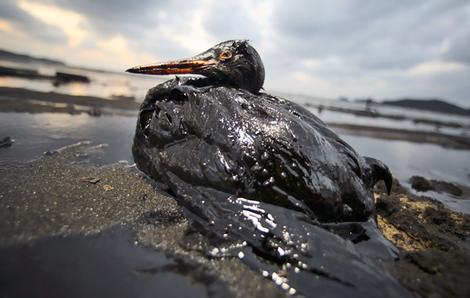BP are accustomed to spilling things it seems. Only recently it has emerged that the multinational oil and gas corporation has dumped between 377 and 755 gallons of oil into Lake Michigan.
Coast guard representatives said that the malfunction occurred at an Indiana refinery.
A team of people were then sent to clean up the mess after oil spilled into the refinery’s cooling water outfall and then into the lake.
BP have since claimed that the majority of visible oil has been cleaned up and that no lasting damage was done.
But this is not the only environmental pollution that has occurred as a result of the carelessness of the corporation.
In 2010, an explosion on the Deepwater Horizon drilling rig killed 11 men and sent millions of gallons of oil into the Gulf of Mexico.
Again, officials from the company tried to play down the seriousness of the incident.
The whole debacle resulted in one of the biggest PR disasters for the firm in decades, and led to a bitter standoff between BP and the government.
Investigations were carried out into the damage and later, evidence emerged that BP went into full ‘damage control’ mode and even tried to influence scientists who were analysing the damage caused by the spill.
Documents obtained under a Freedom of Information Act submitted by Greenpeace revealed how officials from the corporation tried to take control of a $500 million fund pledged by the oil company for independent research into the consequences of the Gulf of Mexico oil disaster.
The documents also showed how officials from BP openly discussed ways to influence the work of scientists supported by the fund, which BP created in 2010.
Russell Putt, a BP environmental expert, wrote in an email to colleagues on 24 June 2010: “Can we ‘direct’ GRI [Gulf of Mexico Research Initiative] funding to a specific study (as we now see the governor’s offices trying to do)? What influence do we have over the vessels/equipment driving the studies vs the questions?”.
The cleanup efforts after the spill took years to complete. Just recently, the oil company BP announced that it was ending its “active cleanup” of Louisiana’s coast – which was also affected by the spill.
In actual fact the oil was spilled in the 2010 disaster and affected 16,000 total miles of coastline including Texas, Louisiana, Mississippi, Alabama, and Florida.
It was also found that although the source of the oil leak was contained in 2010, oil is still washing up on shores, which may cause long-term damages to people living in the area.
Over 8,000 animals (birds, turtles, mammals) were reported dead just six months after the spill, including many that were already on the endangered species list.
And only recently, it was revealed that animals are still dying as a result of the catastrophe.
A report from the National Wildlife Federation (NWF) released this month stated that not only is the oil still there, but more than 900 bottlenose dolphins have been found dead or stranded in the oil spill area since April 2010, when the BP well exploded.
Just last year it was found that dolphins were still stranded, and were more than three times likely to be stranded than they were before the spill.
Roughly 500 dead sea turtles have been found every year for the past three years in the area affected by the spill, while a chemical in the oil from the Deepwater Horizon spill has been shown to cause irregular heartbeats in bluefin and yellowfin tuna which can lead to heart attacks, or even death.
The report also found that sperm whales in the Gulf of Mexico have higher levels of DNA-damaging metals than sperm whales elsewhere in the world. These metals were present in the oil from BP’s well.
A separate report from the National Oceanic and Atmospheric Administration (NOAA) in Barataria Bay, which was heavily oiled during the spill, found that dolphins were underweight and anaemic, and showing signs of liver and lung disease.
Other animals such as turtles, and tuna have also been stranded – many still are.
Following the spill, BP was fined over $4 billion in fines. In March 2012, BP settled around 100,000 claims filed by individuals and businesses affected by the spill.
BP also agreed to spend $105 million over five years to set up a Gulf Coast health outreach program and pay for medical examinations.
The mess also led to the establishment of the Clean Water Act in 2013. In addition, several charges were levied against key officials in BP, most notably, Kurt Mix, a BP engineer in April 2012, who attempted to obstruct justice by deleting messages showing that BP knew the flow rate was three times higher than initial claims by the company.
BP also agreed to plead guilty to 11 felony counts relating to the deaths of the 11 workers and paid a $4 billion fine.
You would think that such an expensive sanction would ensure that a company such as BP would be more careful in their business dealings. However, sadly, this latest oil spill in Lake Michigan which occurred last week, shows otherwise.
It also suggests that simply issuing fines against one of the wealthiest corporations on the planet, has had very little effect on their conduct going forward.
Akashic Times is the UK’s only online, fully independent not-for-profit newspaper that brings you real news from across the globe.
If you want to keep ahead of what is really going on in the world, subscribe to our newspaper via the subscribe button and join our Facebook & Twitter pages. Subscription is completely free ofcourse















Follow Us!